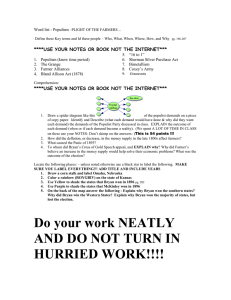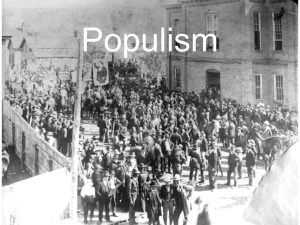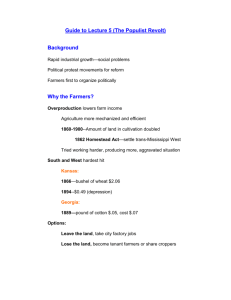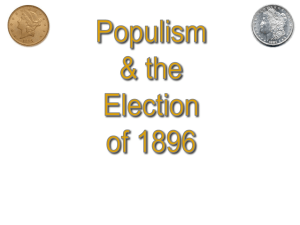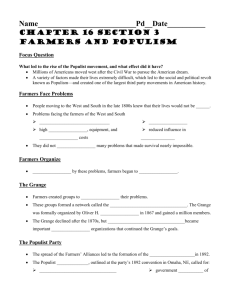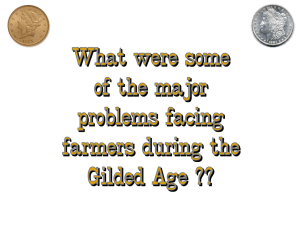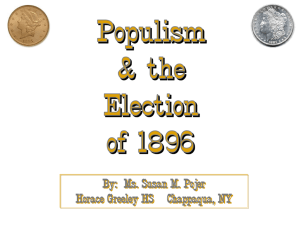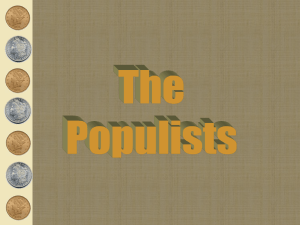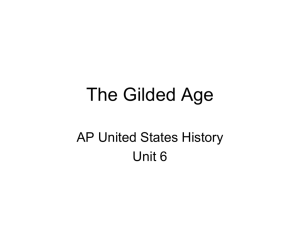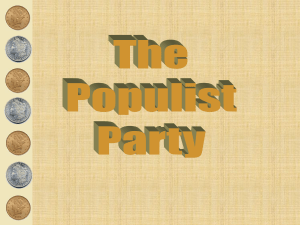Populism & the Election of 1896
advertisement
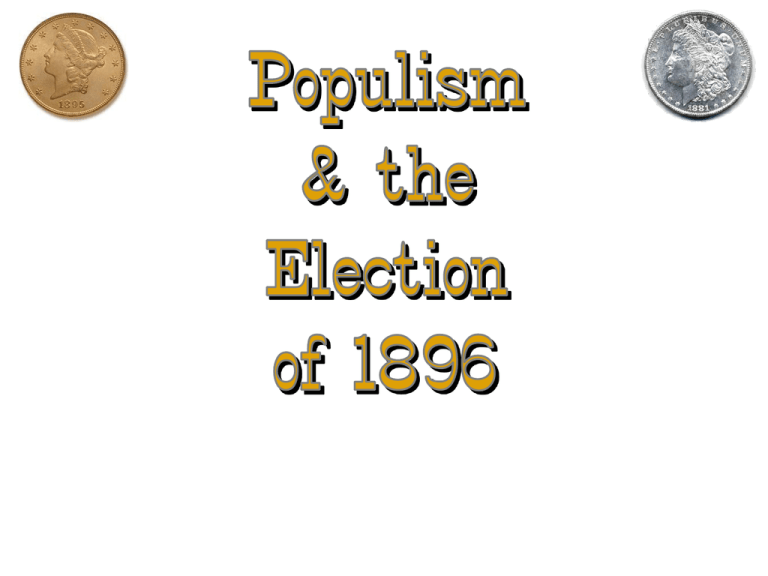
• Mother Nature – droughts, floods, grasshoppers, boll weevil • High Taxes • Tariffs did not protect farmers from foreign competition • One-Crop economy • Deflation – not enough dollars to go around causes lower prices • Railroad Corp. – controlled trans. of crops and the rates • Debt from purchasing new equipment • disorganized Price Indexes for Consumer & Farm Products: 1865-1913 Keeping up with the Competition Farmers had to purchase new equipment to increase production in order to compete Faced disadvantages in the shipping of farm goods • Shipping prices were high and storage prices were high. • Local monopolies controlled the grain storage elevators and the railroads. • Frank Norris’ The Octopus: The Octopus was the railroad companies that wrapped its tentacles around and smothered those that relied on it. Founder of the National Grange of the Patrons of Husbandry (1867) The Grange Movement ; The Rural Modernizes First organized in the 1870s in the Midwest, the south, and Texas. Set up cooperative associations. Social and educational components. Succeeded in lobbying for “Granger Laws.” Rapidly declined by the late 1870s. The Grange Preaches for Change • The grange set up “posts” where meetings were held that took on a religious revival atmosphere – Used the power of Christian moralism to motivate critics of an unethical status quo • Farms were “isolated prisons” of dismal life – build associations to breakdown that lonely life Supreme Court Decisions Munn vs. Illinois (1877) Wabash, St. Louis, & Pacific Railroad Company vs. Illinois (1886) The Farmers Alliances Begun in the late 1880s (Texas first the Southern Alliance; then in the Midwest the Northern Alliance). Built upon the ashes of the Grange. More political and less social than the Grange. Racially integrated Ran candidates for office. Controlled 8 state legislatures & had 47 representatives in Congress during the 1890s. United We Stand, Divided We Fall In 1889 both the Northern and Southern Alliances merged into one—the Farmers’ Alliance. St. Louis Convention Unites the “Victims of Conspiratory Forces” Central Credo of: “We meet in the midst of a nation brought to the verge of moral, political, and material ruin.” Ignatius Donnelly Platform of Lunacy The Populist (Peoples’) Party Founded by James B. Weaver and Tom Watson. Omaha, NE Convention in July, 1892. Got almost 1 million popular votes. Several Congressional seats won. James B. Weaver, Presidential Candidate & James G. Field, VP Women Find Place to breakdown Barriers • Populists pushed for economic independence of women • Mary Lease – fiery eloquent lawyer/speaker “Raise less corn, and more Hell!” • Women used Populist Party to push for suffrage in the states Omaha Platform of 1892 1. System of “sub-treasuries.” (provided farmers with loans and warehouse to store goods until prices were better) 2. Govt. ownership (Nationalizing) of RRs, telephone & telegraph companies. 3. Re-monitization of silver. 4. Direct Election of Senators 5. Graduated Income tax Govt.-Owned Companies Bi-Metallism Issue 1892 Election Causes of the 1893 Panic Begun 10 days after Cleveland took office. 1. Several major corps. went bankrupt. Over 16,000 businesses disappeared. Triggered a stock market crash. Over-extended investments. 2. Bank failures followed causing a contraction of credit [nearly 500 banks closed]. 3. By 1895, unemployment reached 3 million. Americans cried out for relief, but the Govt. continued its laissez faire policies!! Here Lies Prosperity Written by a Farmer at the End of the 19c When the banker says he's broke And the merchant’s up in smoke, They forget that it's the farmer who feeds them all. It would put them to the test If the farmer took a rest; Then they'd know that it's the farmer feeds them all. Coxey’s Army, 1894 Jacob Coxey & his “Army of the Commonweal of Christ.” March on Washington “hayseed socialists!” Result of Election Returns Populist vote increased by 40% in the bi-election year, 1894. Democratic party losses in the West were catastrophic! But, Republicans won control of the House. Gold / Silver Bug Campaign Pins William Jennings Bryan (1860-1925) The “Great Commoner” William Jennings Bryan Revivalist style of oratory. Prairie avenger, mountain lion, Bryan, Bryan, Bryan, Bryan, Gigantic troubadour, speaking like a siege gun, Smashing Plymouth Rock with his boulders from the West. Bryant’s “Cross of Gold” Speech You shall not press down upon the brow of labor this crown of thorns; you shall not crucify mankind upon a cross of gold! Bryan: The Farmers Friend (The Mint Ratio) 18,000 miles of campaign “whistle stops.” “The Populist and Silver Convention Will Be Friendly to Bryan.” Democratic Party Taken Over by the Agrarian Left Platform tariff reductions; income tax; stricter control of the trusts (esp. RRs); free silver. William McKinley (1843-1901) Mark Hanna: The “Front-Porch” Campaign Pres. of Republican National Committee Campaign Manager Raised $16 million Trickle Down Theory “Belly Vote” The Seasoned Politician vs. The “Young” Newcomer Into Which Box Will the Voter of ’96 Place His Ballot? 1896 Election Results Why Did Bryan Loose? His focus on silver undermined efforts to build bridges to urban voters. (consumers did not want inflationary policies) He did not form alliances with other groups. McKinley’s campaign was well- organized and highly funded. Gold Triumphs Over Silver 1900 Gold Standard Act confirmed the nation’s commitment to the gold standard. A victory for the forces of conservatism. The Wizard of Oz by L. Frank Baum 1964: Henry Littlefield’s “Thesis”? What Are the Metaphors? Dorothy ? Silver Slippers ? Kansas ? Emerald City ? Wicked Witch of the East ? Oz ? The Wizard ? Munchkins ? Wicked Witch of the West ? Flying Monkeys ? Tin Woodsman ? Scarecrow ? Cowardly Lion ? Yellow Brick Road ? Legacy • Federal Income Tax – 15th Amendment • Direct Election of Senators – 16th Amendment • Hepburn Act 1906 – More Federal control of the railroads and strengthens ICC • Flexible Currency – no gold standard – after Depression • Progressive push for Initiative, Referendum, and Recall
